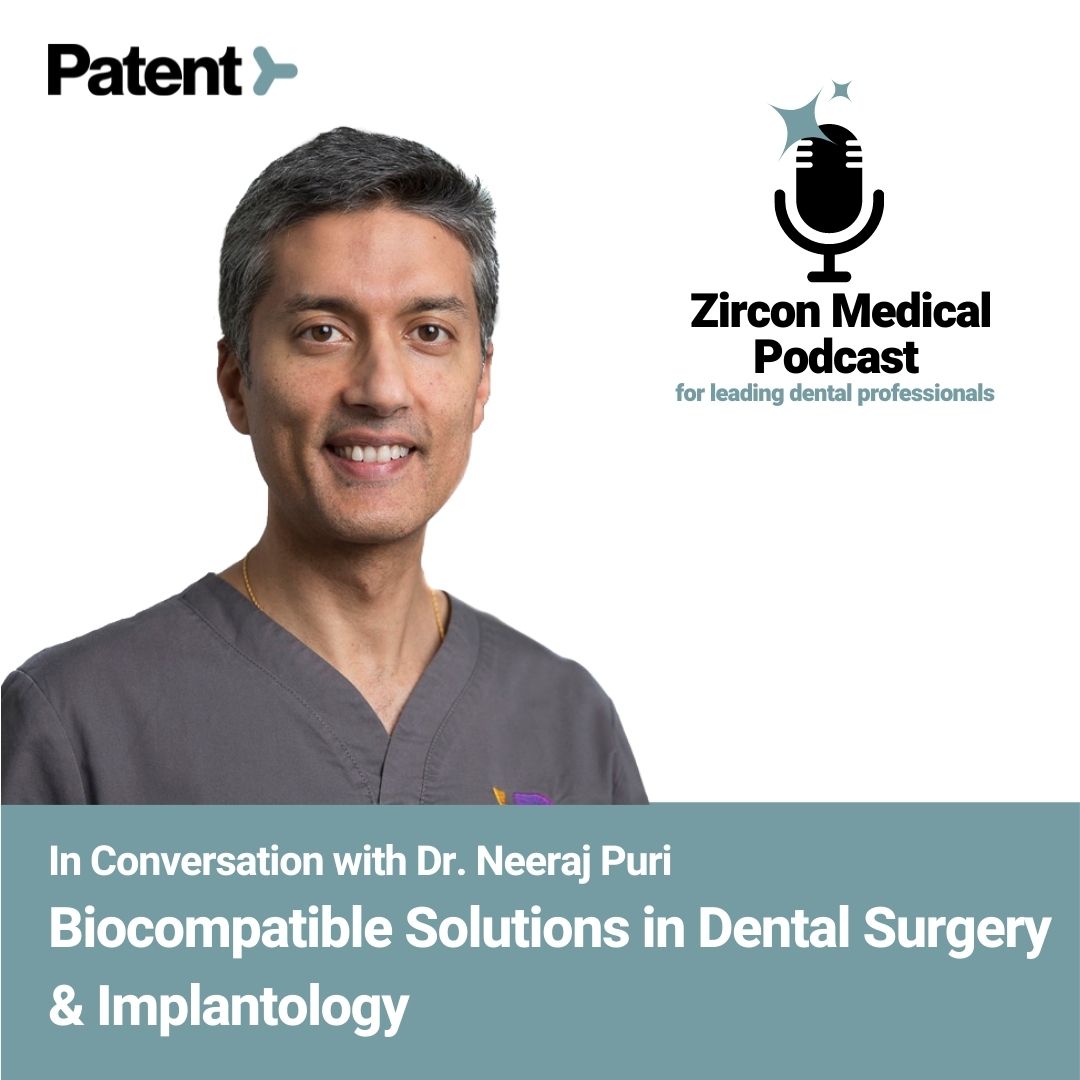
Introducing Dr. Neeraj Puri, the Clinical Director at Integrated Dentalcare and Inverleith Dentalcare
Finding biocompatible alternatives to traditional dental materials
Composite-based products instead of amalgam
Zirconia implants instead of titanium implants
Platelet-rich fibrin (PRF) improves the outcome and reduces the risk of oral surgery
Laser is the ideal tool for cutting flaps and promoting healing
Dr. Puri’s goals for the future — spreading awareness about zirconia implants
Dr. Neeraj Puri
Clinical Director at Integrated Dentalcare and Inverleith Dentalcare in Edinburgh
Qualified as a dentist in Glasgow in 1996
Certificate in Implantology with over 20 years of experience
Supports clients looking for biocompatible dental solutions
Integrated Dentalcare Website: https://www.integrateddentalcare.com/
Inverleith Dentalcare Website: https://inverleithdentalcare.co.uk/
Instagram: https://www.instagram.com/laserguided.implantdentist/
1 Manor Place Edinburgh EH3 7DH, Scotland
In Conversation with Dr. Neeraj Puri
In recent years, the concept of biological dentistry has advanced by leaps and bounds. It has become increasingly clear that oral health is inextricably linked to overall health, and the need for healthier biocompatible solutions must be emphasized. Platelet-rich fibrin, laser technologies, and zirconia implants are some of the many innovations that are paving the way for healthier dental solutions while improving the outcomes of dental surgery.
Our team at Zircon Medical recently hosted Dr. Neeraj Puri, the clinical director at Integrated Dentalcare in Edinburgh, on our podcast series to discuss the importance of biocompatible solutions in dental surgery and implantology.
Introducing Dr. Neeraj Puri, the Clinical Director at Integrated Dentalcare and Inverleith Dentalcare
Dr. Neeraj Puri is the clinical director at Integrated Dentalcare and Inverleith Dentalcare, two private dental practices located in Edinburgh, Scotland. He completed his dental studies at the University of Glasgow in 1996, and he has been certified in implantology for the past 20 years. Dr. Puri is a strong advocate for biological dentistry, and he actively supports clients looking to replace their amalgam fillings with healthier solutions.
Dr. Puri says he always knew he wanted to work in the medical field and work directly with people. He did a brief stint in a hospital for work experience, but he didn’t like the corporate environment — it felt “suppressive” to him. He was first drawn to dentistry because the family dental practice that he visited at the time was always friendly, so he decided to speak with the dentist.
Upon being asked what he liked about dentistry, Dr. Puri’s dentist facetiously replied that it has a high suicide rate and everyone’s scared of you, to which Dr. Puri quipped, “if that’s the good bit, what’s the bad bit?”
Dr. Puri eventually decided to pursue dentistry, and he’s confident that it was the right call. “The mouth is the opening to the rest of the body,” he says, “so you have to get that right. You can go to the gym every day and eat the best food, but if you don’t look at the mouth, it doesn’t matter.”
Finding biocompatible alternatives to traditional dental material
Dr. Puri says he stumbled into biological dentistry accidentally when he came across a company that performed allergy tests for alloys. He found that intriguing because he often placed alloys as a dentist, yet he didn’t really know what was in the product. When he dug deeper into the materials actually used in amalgams, alloys, and titanium implants, he discovered they’re not nearly as healthy as they’ve often been made to seem.
Dr. Puri contends that the dentist’s job isn’t simply to fix the patient’s teeth but to support them on a journey towards optimal health and wellness. To that end, dentistry must become a multi-disciplinary field that takes the patient’s overall health into consideration. That’s why Dr. Puri supports biocompatibility, and that’s why he believes it’s imperative that we find biocompatible alternatives to traditional dental products and treatments.
According to Dr. Puri, the most natural form of dentistry is no dentistry, i.e., avoiding the need for dental treatment with perfect oral hygiene and health. But if a dental treatment must be performed, it should be done using the most biocompatible materials.
Composite-based products instead of amalgam
Dr. Puri says the primary argument for amalgams is that they’re completely safe because they’ve been around for hundreds of years. But 50% of an amalgam is mercury, a product known for being extremely harmful to humans. The argument goes that amalgam is completely stable once it’s set, but that line of reasoning doesn’t withstand further inspection.
Amalgams are placed in an environment that produces crushing forces in milliseconds, with extremes of hot and cold temperatures, strong alkali, and considerable instability. Anything you put into such an environment (even a car!) will inevitably perish. So how can an amalgam remain stable in such an environment?
Dr. Puri now primarily works with composite-based products instead of amalgam fillings. Furthermore, a large number of his patients ask to have their amalgam fillings replaced by composite fillings.
Zirconia implants instead of titanium implants
Dr. Puri asserts that a similar problem exists in the field of Implantology. Titanium implants have been around for a long time, and the initial products were certainly really good. But over time, an alarming number of companies have started producing titanium implants using cheaper materials to make them more affordable for people, leading to a collapse in quality.
While producing titanium implants, companies often play around with the formula, arbitrarily remove certain materials and steps, and use cheaper alloys with aluminum and vanadium. Some materials they use for titanium implants, such as aluminum, are harmful to the human body. Yet, we continue placing metallic alloys in the bone, where it comes in contact with blood, leading to a wide range of possible problems for the human body.
Dr. Puri still uses titanium implants, relying only on high-quality Swiss-made implants with well-documented research, but he favors zirconia implants because zirconia is completely biocompatible and bio-inert. However, he doesn’t replace existing titanium implants with zirconia implants because there’s no medical justification in doing so — not unless the patient is proven to have a titanium allergy, as supported by extensive allergy tests.
Platelet-rich fibrin (PRF) improves the outcome and reduces the risk of oral surgery
Dr. Puri is a big advocate of platelet-rich fibrin (PRF) in oral surgeries. PRF is a natural product drawn from the patent’s blood, and no man-made material or product can beat the human body’s innate healing capacity. The patient’s venous blood is drawn, spun in a centrifuge, and purified to isolate the PRFs. The PRF contains growth factors that are active for up to ten days, according to research.
Dr. Puri says PRF facilitates soft tissue healing and, in his anecdotal experience, reduces the patient’s discomfort and pain. He says his patients report feeling little to no discomfort during extractions when PRF is used, which is amazing. PRF also promotes healthy soft tissue regeneration, and it’s bactericidal, so the risk of potential infections is completely minimized or negated. As such, PRFs improve the outcome of oral surgery while minimizing the risks.
Dr. Puri says PRF is excellent for soft tissue healing, but it doesn’t directly benefit bone growth. PRF primarily helps the soft tissues close over faster, thus increasing the stability of underlying bone regeneration. He often takes PRF, chops it up, and mixes it with the bone graft while placing zirconia implants, or he does an envelope incision and folds the PRF underneath the flap around the abutment. This simple step ensures optimal soft tissue healing.
Laser is the ideal tool for cutting flaps and promoting healing
Dr. Puri says a laser is akin to having a custom-made blade. “With blades, the size of the blade determines what happens underneath,” he says. “Some people have great finesse, but not everyone. But lasers level the playing field because the dentist has much more control to cut through layers of skin. Laser also has a stimulatory effect, healing as it cuts. A scalpel is an assault, but lasers are healing as they’re cutting.”
Dr. Puri uses lasers for cutting flaps because he can design the flap according to his unique specifications, drawing it on the skin. After cutting through a few cell layers, he can also show the prospective results to the patient for their approval before proceeding with the complete procedure. Unlike a scalpel, which leads to considerable blood, lasers make the process bloodless.
Dr. Puri also uses lasers while placing dental implants to improve healing. Laser has a bactericidal effect, minimizing the risk of bacterial infections. He also uses a low-level laser to help with healing, thus impacting the inflammatory curve where the toxins will be released. As such, lasers allow him to minimize the risk of post-treatment bruising while improving the patient’s overall experience.
Dr. Puri’s goals for the future — spreading awareness about zirconia implants
When asked about his goals for the future, Dr. Puri said he plans to promote awareness about zirconia implants. Although zirconia implants have been in the market for 15+ years and display success rates comparable to titanium implants, people still view them as something experimental. He wants the dental community to understand that zirconia implants aren’t witchcraft — they’re extremely safe, reliable, and backed by extensive clinical evidence.
Dr. Puri also intends to learn more about how the human body is affected by gum disease. Recent studies have shown that oral health conditions, such as periodontitis, can increase the risk of heart conditions, Alzheimer’s, and other problems. Dr. Puri wants to study the overall health impact of oral health conditions, further galvanizing the need to adopt biocompatible dental materials and solutions.
You can find Dr. Puri at his private dental clinics in Edinburgh, Scotland, or you can follow him on Instagram or LinkedIn. You can also listen to Dr. Puri at our Zircon Medical Podcast.
Register for our free newsletter.
Never miss one of our weekly episodes with leading dental professionals.











